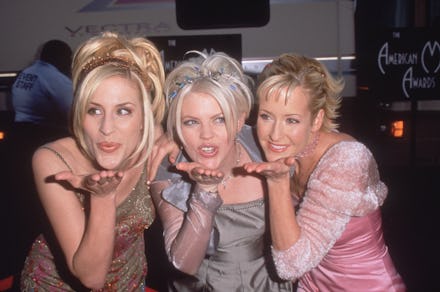The Dixie Chicks, reading the room, changed their name to The Chicks

The band formerly known as the Dixie Chicks are dropping the “Dixie” and going by the Chicks from now on. The change comes as culture writ large casts a critical eye on all sorts of problematic art and entertainment, from statues glorifying colonizers to comedy leveraging blackface. The movement for Black lives has prompted a couple of bands with Southern roots, the Chicks included, to reconsider the connotations of their names and distance themselves from the legacy of racism in America.
The Chicks made the change on Thursday with the drop of their new song “March March.” The band’s social media pages and website have been amended to reflect their new name, and the album art for the Chicks’s forthcoming record Gaslighter has been tweaked, too. The Chicks haven’t released a statement about the name change yet, but a message on their website reads simply, “We want to meet this moment.”
The band’s original name was a play on the 1973 Little Feat album Dixie Chicken. As a refresher, “Dixie” is a nickname for the American South, especially states that made up the Confederacy. It originally referred to states south of the Mason-Dixon line, and crossing that border represented freedom for many enslaved people.
The Chicks have long been outspokenly progressive — they were famously “cancelled” in 2003 for criticising George W. Bush. Last week, Variety writer Jeremy Helligar criticised the band for failing to address the racist connotations of their name. “Their silence has been deafening. This is a discussion we need to have, and they should be a part of it,” Helligar wrote.
Two weeks ago, another country band with a problematic name confronted its legacy and decided to rebrand. Lady Antebellum evidently had a thing for Antebellum-style architecture when they formed; 14 years later, they changed their name to Lady A and issued an apologetic statement: “We are regretful and embarrassed to say that we did not take into account the associations that weigh down this word referring to the period of history before the civil war, which includes slavery."
There’s just one issue with these major acts’ recent rebranding efforts: musical acts called the Chicks and Lady A already existed before these bands decided to clean up their legacies. Anita White is a 61-year-old blues singer from Seattle who’s been performing as Lady A for decades, and she wasn’t happy her name had been swiped.
"This is my life. Lady A is my brand, I've used it for over 20 years, and I'm proud of what I've done," White told Rolling Stone. “It shouldn't have taken George Floyd to die for them to realize that their name had a slave reference to it,” she added.
The Chicks, meanwhile, were a sister act from New Zealand, primarily active in the 1960s. When Pitchfork asked the band formerly known as the Dixie Chicks to comment on their name change, they released the following statement: “A sincere and heartfelt thank you goes out to ‘The Chicks’ of NZ for their gracious gesture in allowing us to share their name. We are honored to co-exist together in the world with these exceptionally talented sisters.”